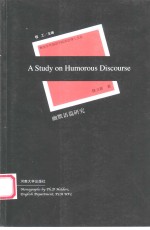
- 作 者:徐立新著
- 出 版 社:河南大学出版社
- 出版年份:2003
- ISBN:
- 标注页数:291 页
- PDF页数:307 页
请阅读订购服务说明与试读!
订购服务说明
1、本站所有的书默认都是PDF格式,该格式图书只能阅读和打印,不能再次编辑。
2、除分上下册或者多册的情况下,一般PDF页数一定要大于标注页数才建议下单购买。【本资源307 ≥291页】
图书下载及付费说明
1、所有的电子图书为PDF格式,支持电脑、手机、平板等各类电子设备阅读;可以任意拷贝文件到不同的阅读设备里进行阅读。
2、电子图书在提交订单后一般半小时内处理完成,最晚48小时内处理完成。(非工作日购买会延迟)
3、所有的电子图书都是原书直接扫描方式制作而成。
Chapter One Introduction 1
1.1 Rationale 1
1.2 Objectives 5
1.3 Research Methodology 7
1.4 The Structure of This Book 9
Chapter Two An Overview of Humor and Its Research 12
2.1 Introduction 12
2.2 Definitions of Humor 13
2.3 Nature of Humor 19
2.4 Humor-related Concepts 31
2.5 Classifications of Humor 38
2.6 Functions of Humor 42
2.7 A Brief Literature Review 46
2.8 Summary 60
Chapter Three Humorous Genres and Mismatches of Generic Structures 62
3.1 Introduction 62
3.2 Fundamental Questions on Research into Humor 63
3.3 Linguistic Humor 65
3.4 Discursive Study of Humor 68
3.5 Humorous Genres 71
3.6 Generic Structure Potential (GSP) 88
3.7 Mismatches of Generic Structures 102
3.8 Summary 115
Chapter Four Linguistic Mechanisms of Humor in Humorous Discourse 116
4.1 Introduction 116
4.2 A Brief Introduction to Linguistic Approaches to Humor 116
4.3 Language, Reality and Thinking 120
4.4 Cohesion and Coherence Features of Humorous Discourse 127
4.5 A Systemic-Functional Approach to Humorous Discourse 140
4.6 Koestler’s Dissociation Theory 149
4.7 Analyses of Two Jokes 154
4.8 Humorous Discourses beyond Humorous Genres 161
4.9 Humorous and Serious Discourse 163
4.10 Summary 165
Chapter Five The Context of Humorous Discourse and the Mismatch of Contextual Features 167
5.1 Introduction 167
5.2 The Necessity of the Contextual Dimension in Humor Research 167
5.3 The Context of Situation 171
5.4 Mismatch of Contextual Features 184
5.5 The Context of Culture 196
5.6 The Context of History 204
5.7 The Nature of the Contexts of Humorous Discourse 208
5.8 Summary 213
Chapter Six The Traits of Individual Interlocutors of Humorous Discourse 215
6.1 Introduction 215
6.2 Humor Competence 216
6.3 Personality 220
6.4 Mood 222
6.5 Intelligence 225
6.6 Gender 227
6.7 Origin or Dialect 229
6.8 Identity 232
6.9 Summary 235
Chapter Seven The Failure of Humor in Communication 236
7.1 Introduction 236
7.2 A Model of Comprehension of Linguistic Humor 237
7.3 General Causes 240
7.4 Psychology 241
7.5 Discursive Competence 244
7.6 Intertextuality 246
7.7 Sociocultural Competence 248
7.8 Other Considerations 251
7.9 Summary 254
Chapter Eight Conclusions 256
8.1 Original Findings of the Current Research 256
8.2 A Discussion of the Current Research in Relation to the General Understanding of Humor 262
8.3 Suggestions for Future Lines of Research into Humor 268
Appendices 272
Bibliography 276
后记 290
